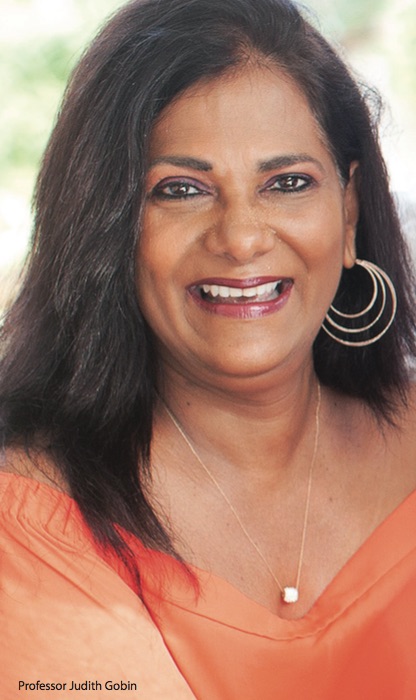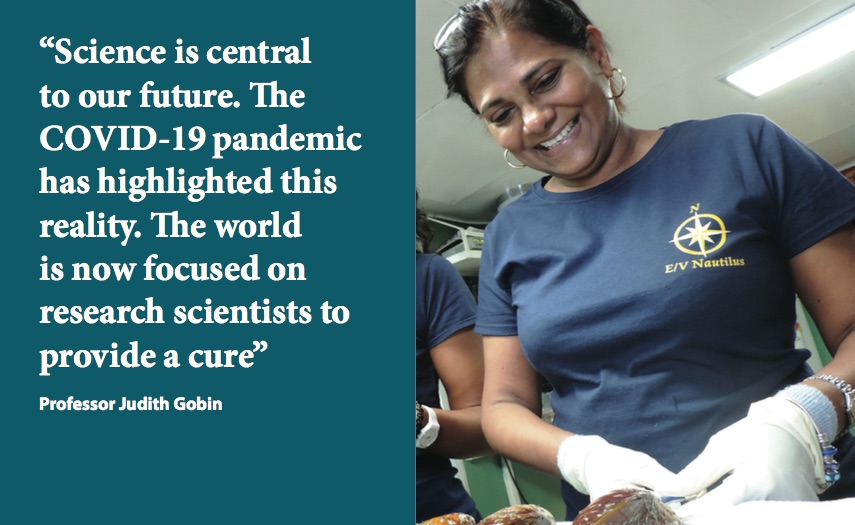Prof Judith Gobin ventures into the depths of the sea and heights of academia
In a small village in Garth Road, Williamsville in South Trinidad, a young girl would develop a fascination with the mysterious oceans that surround us, and what creatures live below their watery depths.
With yearly vacations to the sprawling beaches of Mayaro, Professor Judith Gobin fell in love with our coastal environments— a path that would lead her to become a celebrated marine biologist (the only Caribbean person and scientist from The UWI to ever be appointed to global advisory boards for the DEEP Ocean Stewardship Initiative and the REV Ocean Science and Innovation Committee); and to break the glass ceiling as the first female Professor of Science at the St Augustine Campus (appointed in June of this year). Oh, and she also happens to be the Head of the Department of Life Sciences in the Faculty of Science and Technology.

Professor Gobin has many roles as a teacher, a leader, and a scientist— but the ocean holds her heart. Her research into the marine world spans over 38 years, and she has added a huge swathe of knowledge to the study of Marine Biodiversity in Trinidad and Tobago and the Caribbean.
One of the most interesting parts of this research?
“You get to discover new species of organisms... and you get to name them!” says Professor Gobin.
She has published scientific records on approximately 298 new marine species found in Caribbean waters. She started off looking into soft coastal marine sediments, then rocky shores, and then the most mysterious of all— deep- sea areas. As Professor Gobin describes it, “there is a yet undiscovered world here and we have only seen the tip of the iceberg. The deep sea is the last frontier and one of the most exciting environments to work in!”
But Professor Gobin’s interest in our oceans is not purely academic. It is also a matter of protecting and in some cases rehabilitating the natural world around us.
“Scientific research can provide solutions to many environmental, social and economic problems,” she says. And much of her work, both locally and on the international stage, has been aligned to this idea of using scientific research to address the issues of conservation, sustainability and responsible stewardship of our marine environments.
One of her many projects of this nature is her participation in international discussions headed by the United Nations to create an international, legally binding, instrument under the UN Convention on the Law of the Sea (UNCLOS), on the conservation and sustainable use of marine biological diversity of areas beyond national jurisdiction.

Professor Gobin says, “Due to the global recognition for my marine biodiversity research, I have been invited by a number of organisations to be present and be a scientific partner in this global event.”
She has been participating in this process since 2016.
The traditionally male dominated fields of science, technology, engineering and mathematics (STEM) have long suffered from a limited perspective that can lead to blind spots in research and information, as well as more difficulty for women and other minority groups to excel and be heard. But gradually, the makeup of these fields has been changing, thanks to scientists like Professor Gobin.
“There are various STEM opportunities (other than medicine and engineering) that are fulfilling, interesting, and of real-world value— to respond and solve problems,” she says. These problems require minds from all walks of life to give the fullest picture of what needs to be done.
Especially, she points out, during the international crisis of COVID-19, the value of scientific research and global cooperation is more evident than ever:
“Science is central to our future. The COVID-19 pandemic has highlighted this reality. The world is now focused on research scientists to provide a cure,” says Professor Gobin.
When we acquire more knowledge, we can be better prepared for – or even – prevent future crises. Luckily, interest in these types of fields is increasing. Zeroing in on marine biology/ecology, The UWI has a robust collection of students pursuing MSc, MPhil and PhD degrees in marine sciences and the Department of Life Sciences offers a minor in marine ecology.
Although Professor Gobin is passionate about the ocean, her favourite part of the job is her role as teacher. “Dealing with young people... young minds” is what she loves most about her work.
With her responsibilities as a teacher, parent, global advocate and head of department, Professor Gobin is still finding time to enjoy what she does. First on her list of qualities, a marine biologist must have “love [for] the sea” and it is clear that she has taken this to heart. Of course, that list also includes “long hours in the laboratory”, so it’s not all fun trips to the beach.
With just about 5 per cent of the Earth’s oceans already explored, there is so much more to be discovered in the watery world below us. Professor Gobin is ready to continue venturing into the unknown:
“We have been making strides in marine and environmental research. However, there is still much more to be done and I wish to make a personal appeal to all— the Government, industry and the private sector of Trinidad and Tobago— please channel more funds and resources into scientific research and STEM. It is where our future lies. And to all the young girls and women of Trinidad and Tobago— I cracked the ceiling and so can you!”